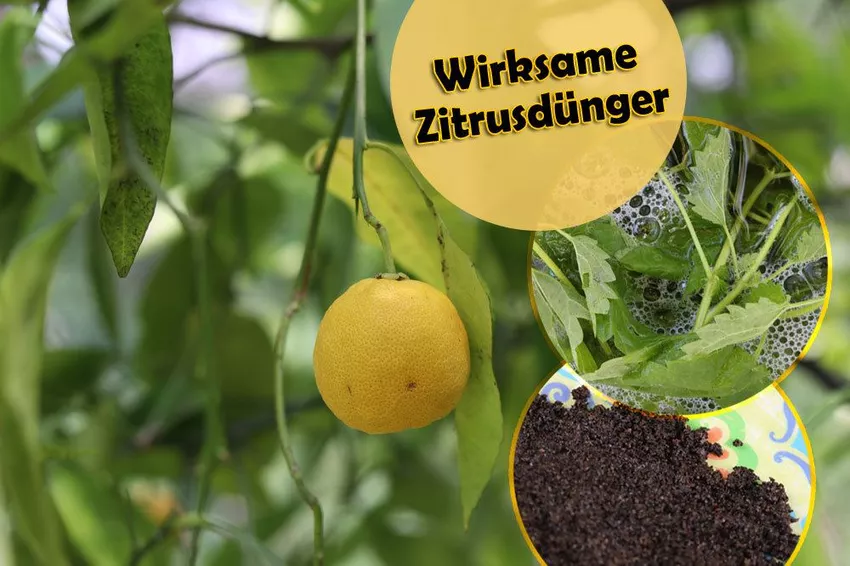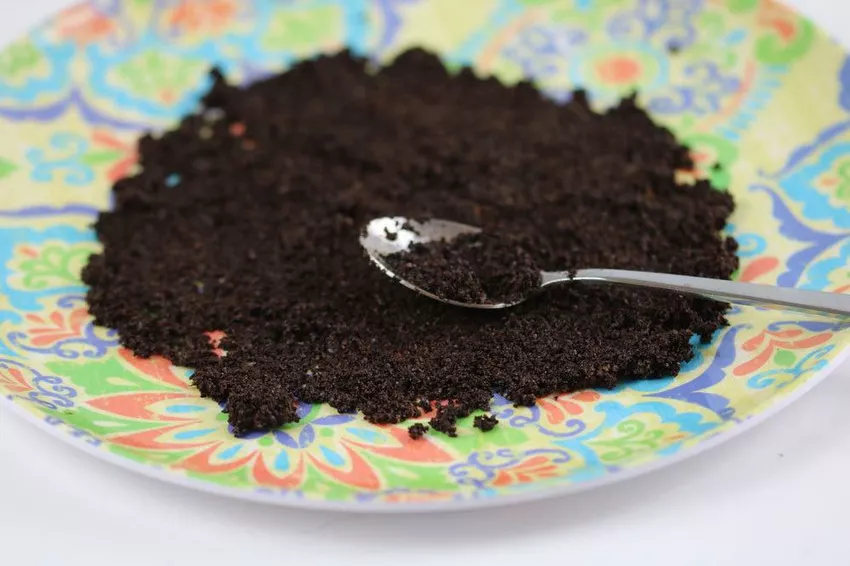
A lemon tree (Citrus limon) can enchant every garden or balcony and terrace with its Mediterranean flair. With its beautiful flowers and yellow fruits, it is probably the most popular citrus plant among the rue family (Rutaceae). In our latitudes, however, only a culture in tubs is possible, since these trees are very sensitive to cold. Sufficient nutrients are necessary for healthy growth, lush flowering and fruit formation. Therefore, a regular and additional supply of nutrients from citrus fertilizers is required.
Fertilize lemon tree
time
Lemons are generally only fertilized during the growth phase. The growth depends on the weather, i.e. the prevailing temperatures and light conditions. The first application of citrus fertilizer must always be done at the beginning of the new shoot. This basic fertilization creates the conditions for lush growth and beautiful, lush green leaves.
During the summer months, the lemon tree has the highest water consumption, as it evaporates a lot of water and grows quickly. The tree now needs additional nutrients. These can be added with the irrigation water. Watering is always done when the top third or half of the substrate is dry. The test is carried out using a finger test or liquid meter. In a nutshell:
- Fertilization period extends from April to September
- additional nutrients always in connection with the watering process
- possible use of rainwater
- Calcareous tap water clogs the lemon’s pathways
- then no nutrient absorption possible
- in summer usually water every week or two
- fertilization should take place at the same time
- The interval between fertilizer applications also depends on the citrus fertilizer used
- Fertilizer with long-term effect, single application in spring
- in autumn only fertilize once or twice a month as long as flowers and shoots are still forming
- otherwise over-fertilization can occur
- do not fertilize over winter until April
- Roots cease activity
- no longer absorb nutrients
- Depending on the location, water every two to four weeks
tip: It is important to pay attention to deficiency symptoms during flowering and fruit formation. If necessary, additional fertilization must be carried out.
identify deficiencies
In citrus plants, the lack of nutrients can manifest itself in different ways. Usually there are no flowers, but the leaves also indicate a lack of nutrients.
- Iron deficiency: leaves turn yellow along the leaf axis, leaf veins remain green
- Zinc deficiency: yellowing of only small areas between the individual leaf axils
- Lack of nitrogen: uniform and complete yellowing of the leaf
- Magnesium deficiency: extensive yellowing, starting from the tip of the leaf
- Phosphorus deficiency: Leaves turn reddish
- Potassium deficiency: necrosis present on leaf edges, leaves turn brown and die
In these cases, an unconditional post-fertilization necessary. Foliar fertilization can be very effective here. The plants can absorb the nutrients faster. But beware of over-fertilization. This can be recognized by the brown dying leaf edges and the premature drying up of young shoots.
composition
An ideal citrus fertilizer should be precisely tailored to the nutrient requirements of the plants. It should consist of
- Nitrogen for growth and green leaf color
- phosphate for growth and flowering and
- Potassium for good fruit formation and healthy development
It should contain the same proportions of nitrogen and potassium. The amount of phosphate can be a little lower, but then at least 2 percent magnesium and other trace elements such as boron, copper, iron, zinc, magnesium, molybdenum and manganese are also necessary.
The trade offers mineral fertilizers as granules and liquid fertilizers as well as organic long-term fertilizers such as horn shavings:
- Mineral fertilizers guarantee a quick supply of nutrients
- Lemon can absorb these directly from the soil
- are available as complete fertilizers in a ratio of 3:1:2 (nitrogen: phosphate: potassium)
- however, contain high salt concentrations
- thereby contamination of groundwater with high nitrate values
- on the other hand, organic fertilizer with a long-term effect protects the environment
- long nutrient supply due to slow decomposition of microorganisms living in the soil
However, it is not always necessary to use chemical fertilizers. There are also many effective home remedies, which can be used as citrus fertilizer.
home remedies
Commercial home remedies should always be preferred over chemical ones as they benefit the environment. Not only are they cheaper, but they also provide the lemon tree with optimal nutrients, promote healthy growth, and prevent and combat deficiency symptoms. The household remedies must be chosen in such a way that the need for nutrients is covered. If necessary, the remedies must be combined, since they have different compositions of nutrients.
coffee grounds
Coffee grounds accumulate in almost every household. It contains valuable ingredients such as nitrogen, phosphate and potassium. The application can either be done with the irrigation water or is simply sprinkled on the ground.
- preventive or corrects deficiency symptoms
- has an acidic pH value, which optimizes the soil quality
- Effect is only short-term
- Application once a month
- Coffee grounds must be dried before each use
- Remove old coffee grounds before fertilizing again
- Otherwise the soil will be compacted and mold will form

tip: Coffee grounds in combination with blood meal provides an additional supply of trace elements that promote growth. Simply mix both agents together.
Black tea
The tea is rich in various nutrients. The leaves, grounds and contents of tea bags can be used as citrus fertilizer. Alternatively, green tea can also be used as fertilizer.
- Tea must be brewed before use and residues must be dried afterwards
- Fertilize once or twice a month
- diluted tea can be watered weekly
- Depending on the size of the plant, work 1 to 3 teaspoons into the surface of the soil or
- mix a cup of tea into the water
horn shavings, compost and stable manure
Horn shavings are available as organic citrus d
younger very popular. The use of manure would be ideal. Unfortunately, this is not always available. On the other hand, compost can be produced by any hobby gardener himself. Both may only be used if they are rotten.
- Extraction of compost soil should only be done from the middle or bottom compost layer
- thorough mixing with the substrate necessary
- so quantities can be evenly absorbed by roots
- Work horn shavings into the soil when potting or repotting
- all means have a long-term effect
- Nutrients are slowly broken down by microorganisms
nettle and comfrey broth
These herbal manures provide the lemon tree with optimal nutrients, and pests can also be combated at the same time. The liquid manure is rich in iron, nitrogen, phosphate, potassium and calcium. The nutrients reach all parts of the plant with the brew, right down to the ends of the roots. The production is quite simple.
- Plants can be used individually or mixed
- Cut 1 kg fresh or 150 to 200 g dried plants into small pieces
- place in sealable translucent container
- Fill up with 10 liters of water
- all plant parts must be covered
- Seal the jar and keep it sunny and warm
- stir in between
- After two to three weeks, the brew is ready when no more bubbles rise
- go through everything
- Use in irrigation water or foliar fertilization by spraying
- Application once a month
- Dilution 1:20 with water

tip: The production goes faster if the parts of the plant simmer for 30 to 45 minutes, then let them simmer for one to three hours. The cooled brew is then strained.
blood meal
It is dried and ground animal blood. It is rich in iron for healthy growth. It also contains 12 percent nitrogen compounds and 80 percent proteins. Actually, one can speak more of organic citrus fertilizer here.
- Application takes place with the irrigation water or distribution on the surface of the earth
- per fertilization 3 tablespoons per plant
- in case of deficiency symptoms 1 to 3 teaspoons per week until the lack of nutrients is remedied
- alternatively use fresh blood from the butcher
- Distribution on substrate
- then water well
- also possible use of frozen blood
- Available in pet food stores as a BARF feed additive for cats and dogs
- Divide blood into small pieces and spread on substrate
- watering is not necessary as it contains water
tip: If the fruit is to be eaten, it is essential to pay attention to the quality and origin of the blood meal or blood.
lemon peel and leaves
Wilted and dried leaves and shells are used. Both contain many nutrients.
- Dry and crumble the fallen lemon leaves
- this prevents mold formation
- Grate the peel or cut into small pieces
- Distribute on substrate surface and work in lightly
- best time spring to autumn
tip: A good fine compost can be made by adding leftover vegetables.
algae
Algae can also be used as citrus fertilizer. They are rich in minerals and vitamins. Because of this, it should not be used too often, as over-fertilization can quickly occur.
- fertilize once a month
- Use a small handful
- alternative use of algae lime
- Caution: the pH of the substrate can be increased to alkaline
vegetable broth
The broth of vegetables and potatoes after cooking is ideal for fertilizing lemon trees. A large part of the ingredients are released into the water during the cooking process.
- the longer the cooking time, the higher the concentration of minerals and trace elements
- Use chilled stock
- optimal supplement when fertilizing with peel and leaves of the lemon
danger: Do not use salt when cooking. Otherwise it would damage the lemon tree!
pond and aquarium water
Both are ideal fertilizers. It contains many microorganisms, which form the basis for optimal fertilization.
- Application by watering can
- once or twice a week during the growth phase
- from late summer then only once a month

